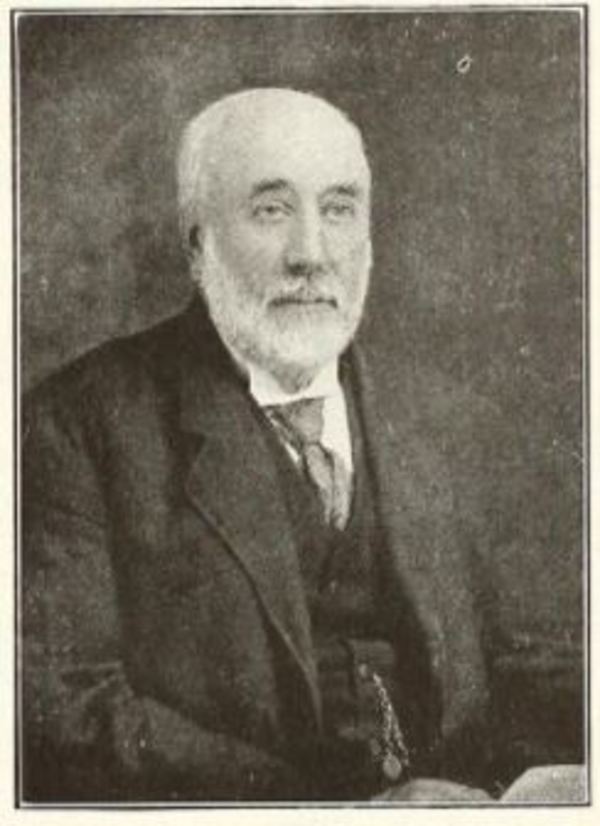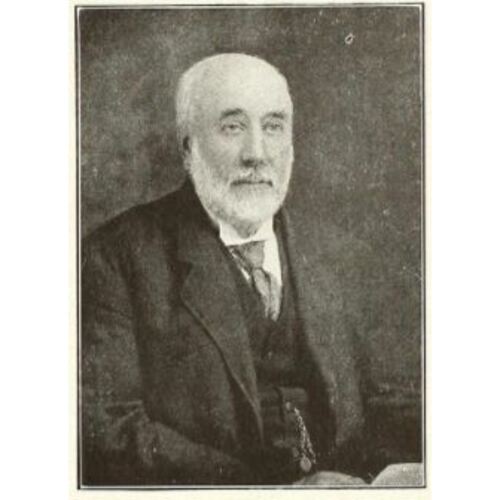
Source: Link
MALCOLM, ANDREW, furniture manufacturer and politician; b. 23 Nov. 1840 in Killearn, Scotland, son of James Malcolm and Marion Duncan; m. 6 Dec. 1876 Annie Robertson in Kincardine, Ont., and they had a daughter and six sons, three of whom died in infancy; d. there 9 Aug. 1915.
Educated at the parish school in Killearn, Andrew Malcom, like many self-made men, seems to have spent his early years ploughing the sands. He displayed no inclination for, or training in, the business that would later make his fortune. If a thread can be followed through his career, it is his facility with accounts. In 1862 he left Scotland for Jamaica, where he secured work as a bookkeeper on a sugar plantation. Two years later he was clerking for a railway in the American Midwest. In 1867 he took up a position with a general store in Monkton, Ont., and shortly thereafter he moved on to manage a store in Blyth in Huron County.
Why he moved in 1874 to Kincardine, on Lake Huron, and entered John Watson’s furniture business as a partner is unknown. A connection may have come through Robert Malcolm, an employee of Watson’s, but there is only the nominal coincidence to suggest a familial relationship. For Watson’s part, it was probably a shortage of capital and his need for a good manager that drew him to Andrew Malcolm. Like so many other furniture businesses in the 1870s – and there were several significant producers in Bruce and Grey counties – Watson’s was growing and he needed money to finance the expansion and knowledge to administer it. In 1876, two years after the arrival in Kincardine of the Wellington, Grey and Bruce Railway, trade was good enough to encourage a move to larger premises and investment in a kiln for drying wood.
But if Malcolm was unusual because he entered the trade by way of the office rather than the shop, the business profited from the combination of Watson’s craft and Malcolm’s management. Together they would transform the business, shifting production from low-grade elm to medium- and premium-grade walnut and oak, attracting the interest of such national marketers as Eaton’s, and expanding to occupy a new lake-front factory with a workforce of over 100. This growth was achieved despite considerable instability within the industry.
Rapid expansion in the 1870s had created excess capacity, particularly since much of the growth, including that at Watson and Malcolm, had taken the form of mechanization. Capital investment and plant capacity almost doubled, but output at the end of the decade was up just 50 per cent. As production rose during the next ten years, industrialists were tempted to hire more workers, and once again the market was flooded. Over the 1890s productivity declined: where $1 in wages had produced $3 in furniture in 1891, ten years later it created a return of $2.75. Manufacturers turned to labour-saving machinery, consolidation, and plant modernization, and by 1911 the industry was booming.
John Watson never saw his firm rise to the crest of this economic wave. He had died in 1895, but Watson and Malcolm was continued by Malcolm, for a time in formal association with Watson’s adopted son and daughter. The business flourished and in 1905 it was incorporated as the Andrew Malcolm Furniture Company Limited. Within two years it was receiving more orders than it could satisfy, and Malcolm again considered expansion. After the Listowel Furniture Company declared bankruptcy and was taken over by the town in 1910, he moved in and an agreement was reached with the town in December 1911. Following a municipal referendum on a snow-swept day in January, he bought the plant for only $1,000 down with $9,500 to follow; Listowel further sweetened the deal with free water and a ten-year exemption on taxes. Turning over management of the Kincardine works to his son James, Malcolm took charge of the Listowel factory, modernized it, and brought his other surviving son, Andrew Ebenezer, into its operation. In 1912 the Malcolms also secured the kind of contract about which every furniture manufacturer dreamed: to furnish the bedrooms of the hotel chain of the Canadian Pacific Railway, beginning with the Banff Springs Hotel and the Hotel Vancouver. This high-volume, top-quality business elevated the company to the premier place in the industry. Other equally secure contracts followed, such as the manufacture of gramophone cabinets for the Columbia Phonograph Company.
An active Presbyterian and member of the Sons of Scotland, Malcolm also took a keen interest in public affairs. He sat on Kincardine Town Council in the early 1880s, and served as reeve in 1884–86 and mayor in 1904 and 1908–10. He was elected as a Liberal to the Ontario legislature for Bruce Centre in 1898, retired in 1902, and ran again, unsuccessfully, in 1905. Ill health prevented his involvement in the years immediately preceding his death in 1915.
Andrew Malcolm had always subscribed to the gospel of work and his policy of operating his factories full time whether business was good or bad became part of the folklore of the industry. One year, the story goes, the Malcolms filled every empty warehouse in Kincardine with furniture and ran close to insolvency. Their workers might complain that they had too few holidays, James Malcolm observed, but it was “better to miss a few ball games and have a full pay envelope every fortnight.” Like innumerable Victorian bourgeois, Andrew Malcolm believed in a fair return for a fair day’s labour. Hardly surprising, he also insisted that every honest person share his concept of fairness. One of the first measures he proposed in the Ontario legislature, in 1899, was an amendment to the Municipal Act that would have allowed the destitute to convey whatever property they possessed to the municipality to “provide for their maintenance” in the local house of industry. It was typical of his attitude: even the unemployed should resist the notion of charity. A patrician to the last, in his will he left bequests to the general hospital and Knox Church in Kincardine and Queen’s College in Kingston, and rewarded his workers with a bonus adjusted to length of employment. Doubtless this formidable self-made man with a parish-school education would have relished the title posthumously bestowed on him by the trade, “dean of Canada’s furniture manufacturers.”
Malcolm’s character had none the less made him a hard man to like. “The worst goods he has in his shop he displays in the front window,” a friend observed. He was big, blunt, and opinionated – the sort of person acquaintances needed euphemisms to describe. More often than not they resorted to the Scottish stereotype: “shrewd,” “candid,” “canny,” and “sturdy” they called him. His home town, a local newspaper avowed in 1915, “would be much better off today if Kincardine had always taken his advice.” Unfortunately, this course was not something he made very easy.
Copies of family papers supplied by Mrs Mary Malcolm Armstrong of Bracebridge, Ont., a great-granddaughter of the subject, are available in Malcolm’s file at the DCB.
AO, F 977, Kincardine cemetery (Kincardine, Ont.), no.1927 (mfm.); RG 22-358, no.5372; RG 55-17-3, nos.202, 1322, 1363; RG 80–5-0–63, no.1578. Bruce County Museum and Arch. (Southampton, Ont.), “The furniture industry in Bruce County.” NA, RG 31, C1, Kincardine, 1881: 32; 1891: 20; 1901, div.1: 6 (mfm. at AO). Stratford Perth Arch., Listowel and area div. (Listowel, Ont.), Andrew Malcolm Furniture Company papers, esp. memorandum on company history prepared for Walter Turner by C. M. Gall, 10 April 1975; Listowel Town Council minutes, 13 Dec. 1911, 10 Jan. 1912. Listowel Banner, 11 Jan., 4 April 1912; 21 Aug. 1913; 12–13 Aug., 13 Sept. 1915; 19 April 1917. Lucknow Sentinel (Lucknow, Ont.), 12 Aug. 1915. Telescope (Walkerton, Ont.), 19 Aug. 1915. Can., Census of Canada, 1870–71 (5v., Ottawa, 1873–78), 3, table no.lv; Census of Canada, 1880–81 (4v., Ottawa, 1882–85), 3, table no.lvi; Census of Canada, 1890–91 (4v., Ottawa, 1893–97), 3; Fourth census of Canada, 1901 (4v., Ottawa, 1902–6), 3, table no.39; Fifth census of Canada, 1911 (6v., Ottawa, 1912–15), 3, table no.xiv. Canadian book of furniture: a short outline of the history and development of furniture, with particular reference to industry in Canada, comp. James Acton (Toronto, 1923). Directory, Bruce County, 1867. Furniture World (Toronto), September 1915. Ont., Legislature, “Newspaper Hansard” (AO mfm. of the debates, 1867–1943), 28 Feb. 1899; Statutes, 1899, c.26. Norman Robertson, The history of the county of Bruce . . . , ed. N. R. Shaw (Toronto, 1906), 117; continued by Norman McLeod, The history, of the county of Bruce . . . 1907–1968 . . . (Owen Sound, Ont., 1969), 388.
Cite This Article
David Monod, “MALCOLM, ANDREW,” in Dictionary of Canadian Biography, vol. 14, University of Toronto/Université Laval, 2003–, accessed April 10, 2025, https://www.biographi.ca/en/bio/malcolm_andrew_14E.html.
The citation above shows the format for footnotes and endnotes according to the Chicago manual of style (16th edition). Information to be used in other citation formats:
| Permalink: | https://www.biographi.ca/en/bio/malcolm_andrew_14E.html |
| Author of Article: | David Monod |
| Title of Article: | MALCOLM, ANDREW |
| Publication Name: | Dictionary of Canadian Biography, vol. 14 |
| Publisher: | University of Toronto/Université Laval |
| Year of revision: | 1998 |
| Access Date: | April 10, 2025 |



